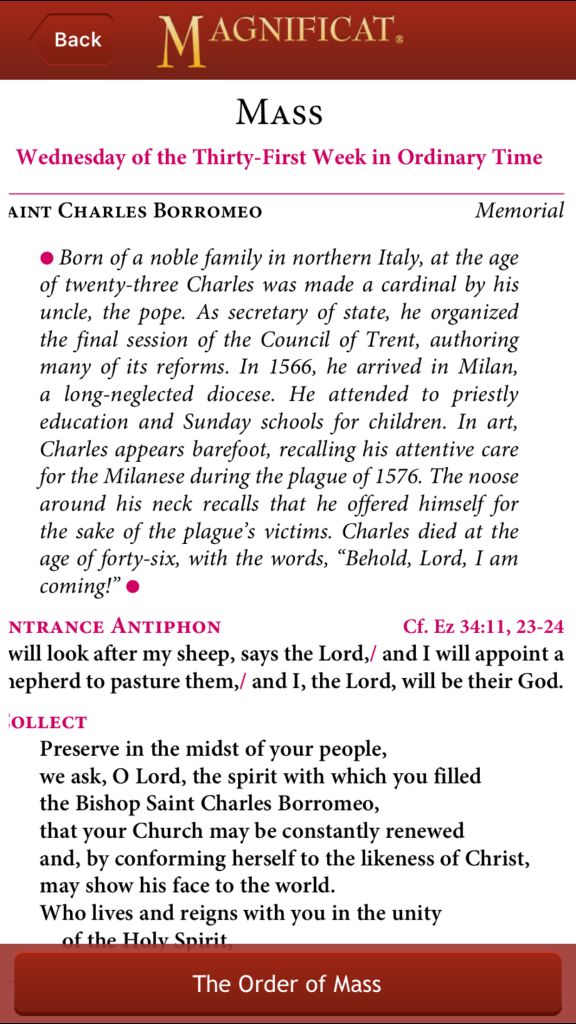1. Can you imagine, for a moment, dying with the words on your lips: “Behold, Lord, I am coming!”
St. Charles Borromeo did. And not because he was cocky. Because he truly lived as a Christian. He knew his Lord and wanted nothing else than to see the face of God.
Here’s Magnificat this morning:
2.
St. Charles Borromeo, patron saint of catechists, catechumens & seminarians; pray for us! #Saints #saints #feastday https://t.co/e9iJ9EzEtR
— Fr. Ed Suszynski (@FrEdS1015) November 4, 2015
3. Here he is in Office of Readings today, from a sermon given during the last synod he attended:
I admit that we are all weak, but if we want help, the Lord God has given us the means to find it easily. One priest may wish to lead a good, holy life, as he knows he should. He may wish to be chaste and to reflect heavenly virtues in the way he lives. Yet he does not resolve to use suitable means, such as penance, prayer, the avoidance of evil discussions and harmful and dangerous friendships. Another priest complains that as soon as he comes into church to pray the office or to celebrate Mass, a thousand thoughts fill his mind and distract him from God. But what was he doing in the sacristy before he came out for the office or for Mass? How did he prepare? What means did he use to collect his thoughts and to remain recollected?
Would you like me to teach you how to grow from virtue to virtue and how, if you are already recollected at prayer, you can be even more attentive next time, and so give God more pleasing worship? Listen, and I will tell you. If a tiny spark of God’s love already burns within you, do not expose it to the wind, for it may get blown out. Keep the stove tightly shut so that it will not lose its heat and grow cold. In other words, avoid distractions as well as you can. Stay quiet with God. Do not spend your time in useless chatter.
If teaching and preaching is your job, then study diligently and apply yourself to whatever is necessary for doing the job well. Be sure that you first preach by the way you live. If you do not, people will notice that you say one thing, but live otherwise, and your words will bring only cynical laughter and a derisive shake of the head.
Are you in charge of a parish? If so, do not neglect the parish of your own soul, do not give yourself to others so completely that you have nothing left for yourself. You have to be mindful of your people without becoming forgetful of yourself.
My brothers, you must realize that for us churchmen nothing is more necessary than meditation. We must meditate before, during and after everything we do. The prophet says: I will pray, and then I will understand. When you administer the sacraments, meditate on what you are doing. When you celebrate Mass, reflect on the sacrifice you are offering. When you pray the office, think about the words you are saying and the Lord to whom you are speaking. When you take care of your people, meditate on how the Lord’s blood that has washed them clean so that all that you do becomes a work of love.
This is the way we can easily overcome the countless difficulties we have to face day after day, which, after all, are part of our work: in meditation we find the strength to bring Christ to birth in ourselves and in other men.
What wisdom, and not only for bishops!!!
4. Some backstory here.
5. Relatedly, I’m just reading a new book from Ave Maria Press called Breath of God. In it, Fr. Dave Pivonka, T.O.R. writes (on the page I just happen to be on right now):
we all are producing fruit that can be seen. However, we rarely take the time to reflect and think about the type of fruit our lives are producing. This is unfortunate because our spiritual well-being is directly related to the type of fruit we produce. Some fruit is good and some is not but we need to be aware that our lives are producing gruit each and every day. I suppose the question we need to ask is if the fruit we produce is ripe or spoiled. Is it a sweet orange or a sour lemon?
It’s why we need to live examined live, and not live on the auto-pilot busyness can seem to necessitate.
7. Portrait of a Saintly Bishop.
8. Fr. Roger Landry on “The Universal Call to Spiritual Heroism.”
9. Confession: I spent a fair amount of time at St. Charles Borromeo Seminary in Philadelphia in the last year or so, helping with some prep work for the World Meeting of Families (and life). It took most of those visits for me to successfully spell Borromeo correctly.
St. Charles Borromeo in @archphilly pic.twitter.com/gJEf6faf7f
— Kathryn Jean Lopez (@kathrynlopez) January 10, 2015
What a beautiful and snowy day at St. Charles Borromeo seminary today at @cathvoicesusa @WMF2015 session! pic.twitter.com/On9o4CP202
— Kathryn Jean Lopez (@kathrynlopez) February 21, 2015
lost at St. Charles Borromeo seminary in @archphilly before @cathvoicesusa @WMF2015 session, look who I find pic.twitter.com/Yr9vMnh86V
— Kathryn Jean Lopez (@kathrynlopez) January 10, 2015
10. St. Charles on Advent. (It’s coming!)
11.
St. Charles Borromeo, heroic reformer and founder of seminaries, pray for us! pic.twitter.com/ONxz11ysGl
— SyroMalabar Diocese (@SyroDioceseCHI) November 4, 2015
12.
Fresco of St Charles Borromeo from the Carmelite church in Trastevere https://t.co/sm08Yi3WoP
— Fr Lawrence Lew OP (@LawrenceOP) November 4, 2015
13. Philadelphia Archbishp Charles J. Chaput in 2013:
One of history’s leading Catholic reformers was Charles Borromeo. Born of a wealthy family in a time of intense religious conflict and Church corruption, Borromeo turned away from privilege to a life of personal humility and zeal for restoring the integrity of Catholic life. He organized the final session of
the great reforming Council of Trent. He compiled Trent’s famous catechism. As a bishop, he carried on his person a small portrait of St. John Fisher, the English bishop and friend of St. Thomas More martyred by Henry VIII. As cardinal archbishop of Milan, he became a revered patron of higher learning and the arts. Above all, Borromeo saw that the key to renewing Catholic life was a well educated,
holy priesthood. That’s where he put his passion, setting the groundwork for modern priestly formation.
15.
St Charles Borromeo, saint and reformer, blest with sanctity and good example, help us to reform our lives. pic.twitter.com/IyMbKap7IQ
— Fr. Patrick Brennan (@Pathound) November 4, 2015













